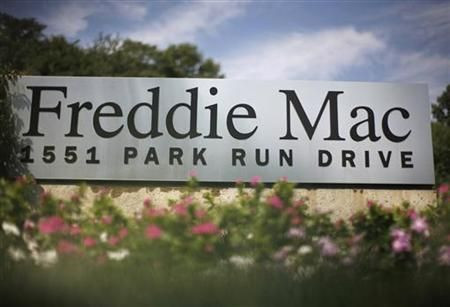Freddie Mac's Image Problem: Conflict of Interest Charged
Analysis

On Monday, NPR and ProPublica published a report revealing that Freddie Mac, the government-owned mortgage giant, had purchased $3.4 billion in mortgage securities that became more profitable if homeowners were unable to refinance at lower rates.
The implication was that Freddie, whose mission is to bolster the housing market, was making a profit by making it more difficult for homeowners to pay off their mortgages.
It's the latest public blow to a firm that has been blamed for its role in the housing crisis, even as it continues to deal with the fallout of the toxic mortgages that it continues to hold. But as Freddie continues to attract controversy, its unusual business arrangement provides additional challenges.
Since a government takeover in 2008, Freddie and its sister company, Fannie Mae, have essentially served two masters: the Federal Housing Finance Agency and the American taypayer. The FHFA, which regulates and now oversees Fannie and Freddie, has said its priority is to minimize taxpayer losses, as the two companies have required more than $160 billion in bailouts as they continue to bleed from pre-recession mortgage holdings.
As a result, the FHFA has been loath to expose Freddie to additional costs, even if they might benefit the overall housing market. The agency has resisted principal writedowns of underwater mortgages, which would relieve homeowners of the difference between their home's current value and the balance of the mortgage, but also cost Freddie and Fannie an estimated $100 billion. Instead, the firms have enacted forbearance, giving homeowners a grace period for mortgages in the event of unemployment or other constraining circumstances.
Freddie and Fannie have also raised underwriting standards, contributing to the difficulty of homeowners who seek to take advantage of historically low mortgage rates. Combined with its investments on high interest rate mortgages, NPR and ProPublica call this "a conflict of interest at the heart of the company."
Freddie said its investments division was separate from its credit division, and Forbes notes that the investments were $3.4 billion out of a $663 billion portfolio -- a small sum that it said was unlikely to drive policy.
Nonetheless, the revelation compounds a negative public impression of the firm. During the Republican presidential campaign, Mitt Romney and Newt Gingrich have verbally jousted over ties to Freddie Mac, and politicians from both parties have portrayed the firm as a driver of the financial crisis, or at least an exacerbator.
Last year, executives from Fannie and Freddie were brought to testify in Congress on bonuses, while former executives were indicted by the Securities and Exchange Commission for allegedly misleading investors.
Historically, Freddie was known as a fierce player in government and had its share of trouble prior to the recession.
In a 2003 report from the FHFA detailed how the firm used "intense and somtimes improper efforts" to modify earnings to meet the expectations of Wall Street, which led to large bonuses for its executives. As a result of audits, the firm had to restate $5 billion in earnings.
But after it was taken over by the government in 2008 as it teetered towards insolvency, Freddie's influence was diminished. Unlike the bailouts of the major Wall Street banks, Freddie and Fannie's government takeover demolished the firm's stock and former executives were dismissed without severance. Freddie's army of lobbyists were banished.
With its future uncertain -- politicians have proposed unwinding both mortgage giants to reduce government exposure to housing -- Freddie finds itself at perhaps its weakest strength politically. And the controversy keeps coming.
© Copyright IBTimes 2024. All rights reserved.





















